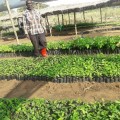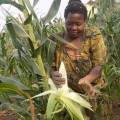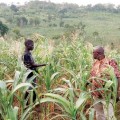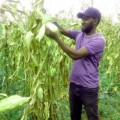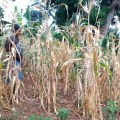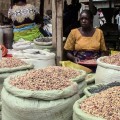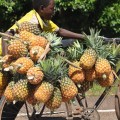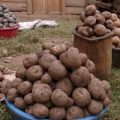FARM NEWS
Food shortage looms as lockdown hits farmers
Published
6 years agoon
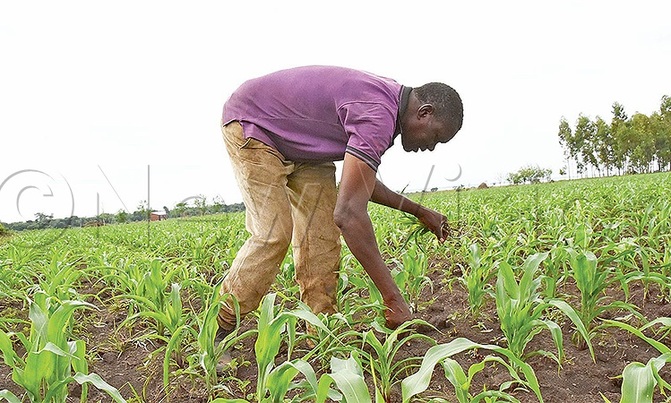
A farmer uprooting weeds from his maize field in Kasese district. The COVID-19 lockdown has prevented farmers from accessing farm inputs. (File photo)
AGRICULTURE
Food production is often a combination of different factors, ranging from access to the right seeds, fertilisers, pesticides and good agronomical practices, which work together to ensure good yields.
However, restrictions on the movement of people caused by the ban on public and private transport in the wake of the COVID-19 pandemic constrained the procurement of farm inputs, including planting materials, fertilisers, pesticides, feed and veterinary services.
Industry players say limited access to inputs has affected a number of farmers around the country, while low supplies of pesticides is hampering efforts to contain pest outbreaks and will likely affect agricultural production, causing food shortage later in the year.
The Uganda National Farmers’ Federation (UNFFE) president, Dick Nuwamanya, said the sector will see food production drop to between 15% and 40% due to the disruption caused by the spiral effects of the COVID-19 pandemic.
The crops he expects to be most affected are pulses, especially beans due to the shortage of bean-seed at the start of the first planting season.
Nuwamanya said while Uganda has 10 ecological zones whose seasons fall at different times, most of them had not yet received seeds by the time of the lockdown and thus farmers did not plant.
He added that planting was not as optimal as usual, even in the districts supported by the Agriculture Cluster Development Project (ACDP). The project was put in place to raise on-farm productivity, production and marketable volumes of selected agricultural commodities, including maize, beans, rice, cassava and coffee in Amuru, Kalungu, Iganga, Ntungamo, Nebbi, Masaka, Mpigi, Rakai, Bugiri, Namutumba, Nwoya, Gulu, Kabaale, Bushenyi and Isingiro districts.
The Food Rights Alliance executive director, Agnes Kirabo, also said most smallholder farmers rely on public transport and that its absence meant that they could not access farm inputs and markets to sell their produce.
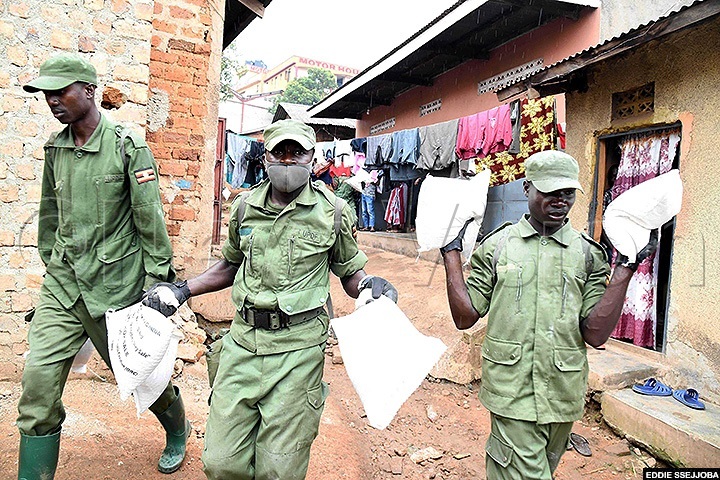
She added that because of the lockdown, a few farmers were able to plant as expected, which will result in low production, thus limited food supply to markets, which will in turn increase food prices yet many households are struggling financially.
“We have made farmers to rely on the Government or civil society organisations to get inputs; that should change. We need to find other ways to support farmers,” Kirabo said, adding that the Government should supply farmers with inputs early so that they prepare for the next season.
SCHOOLS EFFECT
Nuwamanya said while there seems to be plenty of food in the country currently, huge shortages are expected going forward, especially when schools, which are the major consumers of farm output, are opened.
“We seem to have plenty of food considering the circumstances, but this is not going to continue in the next few months, especially if God grants us the opportunity to unlock the country. The current food surplus is because of reduced consumption because of the lockdown,” he said.
Nuwamanya added that about sh500b goes into workshops in Uganda annually, which boosts food consumption.
Edward Katende, the Uganda Agribusiness Alliance chief executive officer, who is also a farmer, said while there is still plenty of food in the country, the Government needs to invest in crop protection to ensure the monitoring of pests and diseases early enough to ensure timely intervention.
For instance, there was an outbreak of destructive caterpillars in Kayunga and Luwero districts, threatening food security and farmers’ incomes.
Katende also called for enhanced investment in postharvest handling practices to curb post-harvest losses. It is estimated that over 30% of agricultural produce in Uganda is lost due to poor post-harvest handling.
The Agrarian Services executive director, Robert Serwanga, said the poultry business has been hit by shortage of feeds and veterinary services in some parts of the country, which is expected to affect production.
“The birds need routine vaccination, but farmers could not easily access vaccines,” he said.
CHEMICALS TO EXPIRE
Agro-chemical dealers at Container Village in Kampala said while the Government allowed them to operate as part of the other essential sectors, they have not benefited and fear that most of their pesticides and other agro-chemicals which they had stocked would expire.
This is because the majority of their customers are from upcountry and could not move to Kampala because of the ban on public transport.
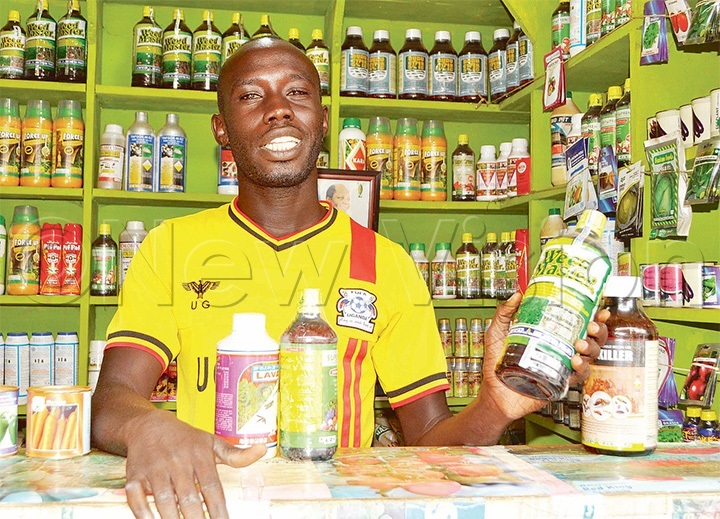
“We are happy to be among the people who were allowed to work during the lockdown although we have not benefited much. Most of our customers come from rural areas in districts like Masaka and Mubende. They could not easily travel here to buy agro-chemicals due to lack of transport,” Swaibu Mulondo, a dealer in agro-chemical products, said.
Sarah Kalande, another agrochemical products dealer, said: “It is our prayer that public transport resumes as scheduled so that farmers can easily make it to town and purchase agro-chemicals. Some farmers had resorted to sending bodabodas to buy the chemicals, which made it expensive for them.”
While the National Agricultural Advisory Services (NAADS) spokesperson Khadija Nakakande said they had distributed about 498,000kg of maize seed to farmers in different districts, it was not enough to cover all the farmers in the country.
Nakakande said they plan to distribute between two million and three million kilogrammes of additional maize seed targeting districts in eastern, northern and parts of central regions whose rainy season goes up to July, while the other regions will receive planting materials at the beginning of the second season in August.
She said there were plans to distribute bean seeds, although they are scarce. While there are reports of farmers who have lost animals and birds due to the lockdown, Nakakande said their plan is to ensure that farmers have access to the relevant agricultural inputs during and after COVID-19 for increased production and productivity as well as improved household incomes.
Original Post: New Vision
You may like
-
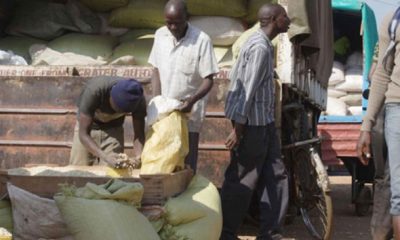

African farmers and agribusinesses need fair access to markets
-
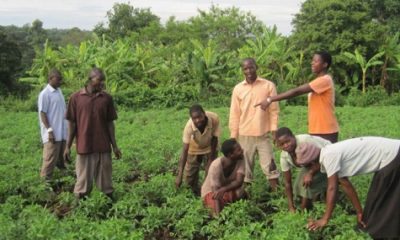

Access to land, capital hampering youth’s involvement in agri-business
-
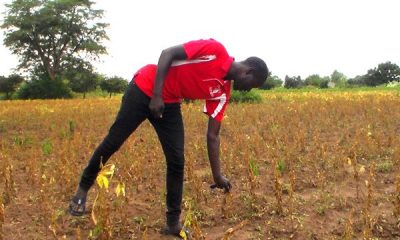

Farmers count losses as drought hits north
-
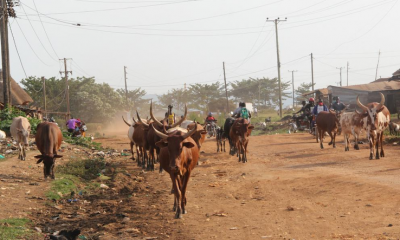

Foot and mouth disease outbreak confirmed in Jinja
-
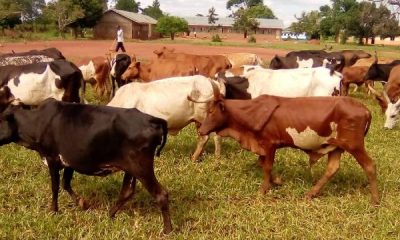

Anaplasmosis disease killing cattle in Bududa
-
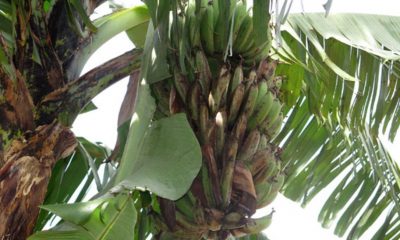

Kabale banana farmers battle bacterial wilt again
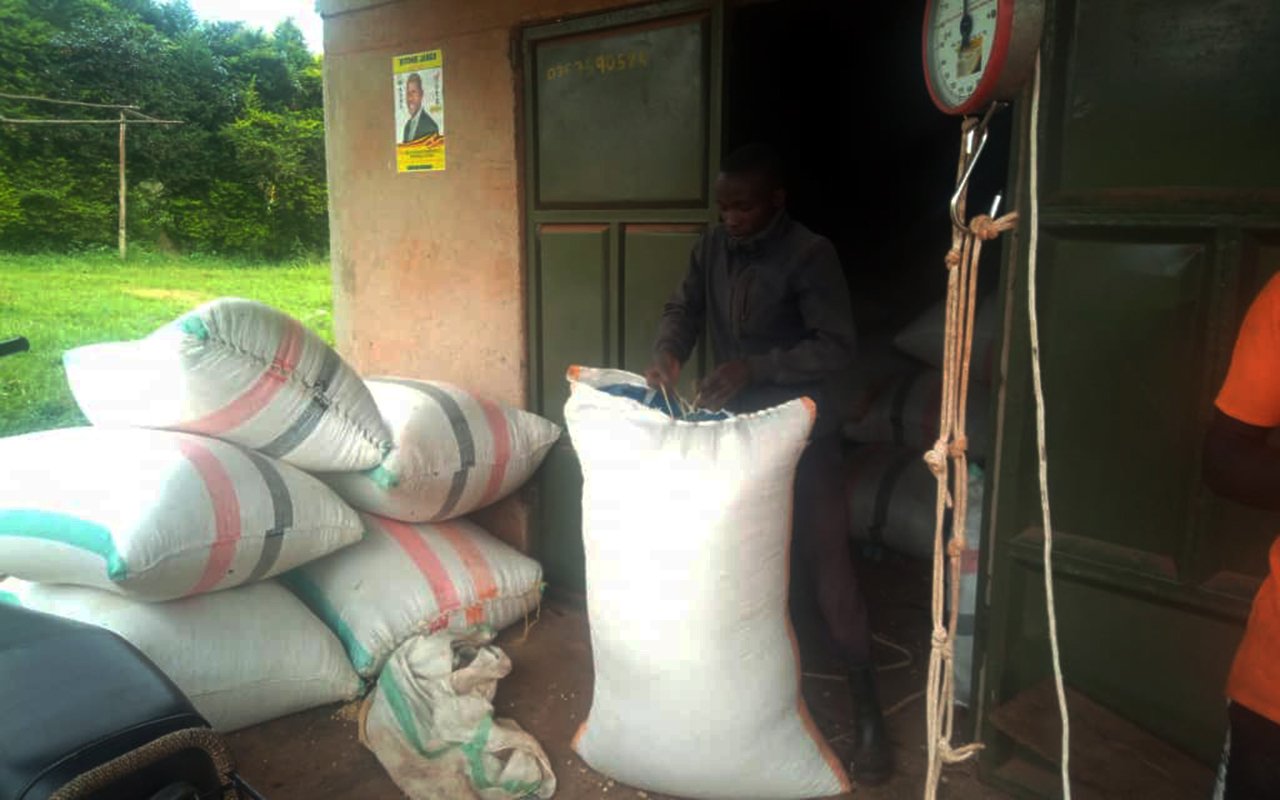
Farmers in the greater Kibaale area, covering Kagadi, Kakumiro, and Kibaale districts are counting losses after maize prices dropped sharply during the peak harvest season.
Many farmers said they had invested a lot of money, hoping for better profits, but the market prices let them down. They blamed the low prices on the high supply of maize, saying many people planted the crop after making good profits in the previous season.
Last season, a kilogramme of maize was sold between Shs900 and Shs1,000, but this season the price has fallen to between Shs500 and Shs700.
Farmers said the sharp drop has left them without profits, with only middlemen and casual workers benefiting.
Mr Dezii Katongore, a large-scale farmer in Kitonya Village, Bubango Sub-County in Kibaale District, said he spent more than Shs2m on pesticides, labour, and renting land to grow maize, expecting to earn more than Shs4m. He planned to harvest 90 sacks but only got 52 because of a long dry spell after planting.
“To my dismay, I sold at Shs750 per kilogramme instead of Shs1,000 as I had anticipated. Losses start even before the market stage. I had nowhere to store the maize. If I had kept it, it would have spoiled. I don’t know if I will farm maize again next season,” he said in an interview on September 8.
Similarly, Katangwe Birungi, a small-scale farmer from Kataara Village in Kibaale District, said he invested more than Shs1m in his four-acre maize farm at the start of the season.
He harvested 28 sacks, earning about Shs1.26 million instead of the more than Shs3 million he had expected. Mr Birungi said he was unable to raise enough money to pay school fees for his children. He now plans to switch to beans, saying their prices are more stable.
Mr Businge Byamukama, a resident of Kijungu Village in Kagadi District, shared a similar experience. He spent nearly Shs900,000 on labour and farm inputs for his two-acre maize garden but harvested only 27 sacks.
Mr Byamukama was forced to sell each kilogramme at Shs250, far below what he had hoped, earning just Shs1 million. He said from the little he earned, he had to clear a Shs300,000 loan, pay Shs200,000 in school fees, and settle hospital bills of Shs100,000.
What remained, he said, was hardly enough to take care of his family.
“I was forced to sell because I couldn’t afford storage. I am now planning to intercrop next season because relying on just one crop isn’t sustainable. I want to switch to beans,” he explained.
Mr Zimwanguhiiza Byaruhanga, a farmer from Kibaale District, said he invested about Shs800,000 in labour, pesticides, fertilisers, and seeds for his two-acre garden. He had expected at least 20 sacks but ended up with only 16.
“What we put in doesn’t match what we got out. We’ve been neglected, yet agriculture is a major contributor to the country’s economy. Why doesn’t the government set regulations to fix prices for farmers? We’re making losses on some of the money we invest, including bank and Sacco loans, and now we’re finding it hard to pay them back,” he said.
He said he had hoped to sell his maize at Shs1,000 per kilogramme, but the market only offered Shs500. Mr Byaruhanga accused middlemen of exploiting farmers by setting unfair prices during harvest time and urged government to step in and regulate the market. ‘
“Even after harvest, the middlemen manipulate measuring tapes to cheat us. But we have no choice—we must sell to support our families, pay loans, and school fees,” he said.
Source: Monitor

A smallholder tomato farmer in the northwestern Uganda region of West Nile sprays his half-acre tomato garden without adequate protection. Many farmers around the country interact with hazardous agro-chemicals without using adequate PPEs. COURTESY PHOTO/SASAKAWA AFRICA ASSOCIATION.
A consortium of civil society organisations (CSOs) has in a Jan.05 statement shown concern about the continued wrong use of dangerous pesticides in the country.
Members of the concerned CSOs mainly work to promote sustainable agricultural trade, food safety and sovereignty, climate justice, biodiversity restoration, and human and environmental rights.
The activists say there are growing concerns about pesticide misuse, including improper application and storage, counterfeit products, insufficient training in use, and use of poorly maintained or totally inadequate spraying equipment.
The activists insist the agriculture ministry should deregister at least 55 agro-chemicals that it registered in 2023 well-knowing that the same pesticides, herbicides and insecticides are banned by the European Union, a major market of Uganda’s agricultural produce.
Glyphosate-based herbicides, in particular, have raised significant alarm due to their potential environmental and health risks. Globally, they have been linked to contamination of water sources, soil degradation, and potential carcinogenic effects on humans.
In Uganda, glyphosate which appears in brands such as Rounduo and Weed Master, is widely used, especially among large-scale commercial farms and in weed control.
Betty Rose Aguti, the Policy and Advocacy Specialist at Caritas-Uganda who also doubles as the National Coordinator of Uganda Farmers Common Voice Platform says Uganda’s smallholder farmers need to be guided on the danger posed by some agro-chemicals.
“No one is guiding them on what to do with the agro-chemicals. Nobody is telling the farmers which agro-chemicals to use in what type of soils or on which type of crops and thereafter, what period of time they should take before they harvest.
“We have scenarios where some of these farmers apply these agro-chemicals bare-chested with no face masks and other protective gear; these farmers are using agro-chemicals as though they are using ordinary water.”
“They spray their gardens as they converse with their children and wives. In the course of doing this, they are inhaling the chemicals and after some time, they fall victim to the toxicity of these agro-chemicals and end up flooding the Uganda Cancer Institute,” she says.
What are pesticides?
Pesticides are defined by UN agencies; the Food and Agriculture Organization (FAO) and the World Health Organization (WHO), as substances or mixture of substances of chemicals or biological ingredients intended for repelling, destroying or controlling any pest, or regulating plant growth.
These often include ingredients that modify pest behaviour or their physiology (insect repellents) or affect crops during production or storage (herbicide safeners and synergists, germination inhibitors), as well as insecticides, fungicides and herbicides.
However, according to the activists, most of the chemicals on the Ugandan market are quite hazardous to both human health and the environment and yet they continue being used inappropriately by Ugandan smallholder farmers.

“We call upon the government of Uganda to regulate and ban all hazardous pesticides especially glyphosate and chlorpyriphos on the market in Uganda,” said Jane Nalunga, the Executive Director of the Uganda chapter of the Southern and Eastern Africa Trade Information and Negotiations Institute (SEATINI), a regional NGO that promotes pro-development trade, fiscal and investment-related poicies and processes.
Backbone of Uganda’s economy
The activists say Uganda’s agriculture sector is the mainstay of Uganda’s economy as it remains the main source of food, raw materials for industries, and employment of about 70% of Ugandans. The sector contributes about 24% to the country’s GDP.
“We cannot allow people with intellectual dishonesty to continue playing with the sector,” one of the activists said on Jan.5 during a press conference at the SEATINI-Uganda headquarters in Kampala. “We are aware that pesticides are significantly impacting health, biodiversity, socio-economic well-being, trade, and food security,” added Nalunga.
According to a 2020 World Health Organisation report, about 385 million cases of unintentional pesticide poisoning, including 11,000 deaths, mostly in low- and middle-income countries such as Uganda, are registered annually worldwide. According to UNICEF, pregnant and breastfeeding mothers, children under the age of five and the elderly are the most vulnerable to the effects of pesticides.
The activists say increased use of highly hazardous pesticides in Uganda is a threat to the right to adequate food, people’s livelihoods and farmers’ rights. They say pesticide runoff is reducing aquatic species diversity by 42% and threatening pollinators like bees. These insects are particularly critical for 75% of global crop production.
According to the European Environmental Agency, pesticides are intrinsically harmful to living organisms. When used outdoors, they can impact ecosystems even when they are intended to exclusively target a specific pest.
Herbert Kafeero, the Programme Manager at SEATINI-Uganda says the use of hazardous pesticides also has implications for trade. He says, in 2015, the government of Uganda imposed a self-ban on the export of agricultural produce to the EU because agro-chemical residues had been found in Uganda’s agricultural produce. “The self-ban was meant to address the challenges that were cited by the EU,” he says, “So we cannot ignore the fact that hazardous pesticides negatively impact the country’s trade and food security.”
He says, at the time, the government committed to retrain farmers and exporters to the EU regarding the EU’s sanitary and phytosanitary standards. Kafeero says the government must find solutions to the mushrooming agro-chemical dealers on the market.
“In every trading centre, you will not miss finding an agro-chemical shop and the person operating that agro-chemical shop presents himself as an expert when they actually are not.”
The activists want the Agricultural Chemicals Control Board under the Ministry of Agriculture, Animal Industry and Fisheries to quickly profile the various agrochemicals, acaricides and inputs and their various sources that are available on the market in Uganda and ban the highly hazardous ones.
They also want the Department of Crop Inspection and Certification at the agriculture ministry to strengthen the regulation, management, use, handling, storage and trade of agrochemicals in the country.
They also want the government and other stakeholders to purposively plan and budget for education and awareness on the management, use, handling, storage and trade of agrochemicals in Uganda.
Prof. Ogenga Latigo disagrees
The activists were infact responding to Morris Ogenga Latigo, a Ugandan professor of entomology (study of insects) who had written an opinion on December 31, 2024, downplaying civil society’s concerns about hazardous pesticide and insecticide use in Uganda.
Prof. Ogenga Latigo in his article said the issue of agro-chemical use on farm pests and weeds and households was being exaggerated by civil society. He said the targeted agro-chemical inputs (pesticides, insecticides and herbicides) were being used in other countries.
The acrimonious debate has since sucked in the agricuture ministry. Stephen Byantware, the Director in charge of Crop Protection at the agriculture ministry told the media in Kampala recently that Uganda has an Agriculture Police Force and a Department of Inspection and Certification of agriculture inputs that “ensure that only nationally and globally approved agro-chemicals enter the Ugandan market.”
“The chemicals allowed into the country are those that have been approved,” he said, “There are no banned products on sale in Uganda. You cannot find DDT or Endosulfan in Uganda.”

But David Kabanda, the Executive Director of the Centre for Food and Adequate Living Rights, a Kampala-based non-profit, says Ugandans should know that hazardous pesticides have become one of the “loudest killers” and yet Ugandan smallholder farmers continue to associate with these chemicals on the farms, in the food stores, and in the homes.
“It’s only in Uganda where we don’t have a farmgate policy and yet we have scientific reports that have pointed out that the food we buy in markets in Kampala is contaminated.” “Don’t we see tomatoes and broccoli full of Mancozeb fungicide yet this chemical has been banned everywhere including the EU?”
“Pesticides are silent killers of humans, of nature, of our soils that are getting barren, of our water, of our agri-food system. I don’t imagine an agri-food system in Uganda without bees, without butterflies, and above all, without grasshoppers,” said Agnes Kirabo, the Executive Director of Food Rights Alliance (FRA).
Desperate smallholder farmers
According to the activists, Uganda’s agriculture system is by default largely organic but in recent years, pest and disease management has become one of the major production constraints for the country’s millions of subsistence farmers. And in recent years, farmers have turned to pesticides to control the pests.
According to the Food and Agricultural Organisation (FAO) of the United Nations, the number of agricultural pesticides used in Uganda doubled in 12 years (2010 – 2022) from 2,990.23 tonnes to 6,009.78 tonnes.

Similarly, the monetary value of pesticides imported to Uganda more than doubled from US$ 32.57 million to US$75.87 million in 2022 with a peak import value of US$108.57 million reported in 2020. The lucrative agro-chemical business has attracted more than 40 registered pesticide importing companies in the country.
The activists say the increased use of pesticides is attributed to their use for weeding and the increased use of hybrid seeds and livestock. According to the CSOs, equally alarming is that many of these pesticides are “synthetic pesticides” which are persistent organic chemicals.
A study published last year by the Food Safety Coalition Uganda (FoSCU) titled: ‘‘Food Safety-Crop Protection Nexus: Insights from the Uganda’s agriculture sector,’’ noted that of the legally registered active ingredients, 47.8% (of the active ingredients) and 68.6% of the brands in Uganda qualified as “Highly Hazardous Pesticides.”
Highly Hazardous Pesticides (HHPs) are classified as “reproductive toxicants” meaning they potentially can negatively affect the human reproductive system and have adverse effects on pregnancy outcomes and reduced fertility.
The same study noted that 15.6% of the registered active ingredients and 19.2% of the registered brands in Uganda qualified as highly hazardous pesticides in accordance with the FAO/WHO-Joint Meeting on Pesticide Management (JMPM) criteria.
According to the activists, by July 2023, over 65% of the 55 flagged active ingredients registered for use in Uganda and yet considered as highly hazardous pesticides according to the Pesticide Action Network (PAN) criteria, were not approved for use in the European Union economic bloc.
The majority (49%) of these pesticides are highly toxic to bees, 20% are carcinogenic and reproductive toxicants while 18% are probable carcinogens, and 9% are highly persistent in water and soil and are highly toxic to aquatic organisms.
They say that, based on the Uganda agrochemical register at the Ministry of Agriculture, Animal Industry and Fisheries (MAAIF) and the National Drug Authority (NDA), the country had at least 115 active ingredients and 669 brands of synthetic pesticides legally registered for use in Uganda by the end of 2023.
“These are presenting in 459 brands, but all these active ingredients in the 459 brands, according to the PAN, are classified as highly hazardous,” said Bernard Bwambale, the head of programmes at the Global Consumer Centre, or CONSENT, who also coordinates the activities on food safety at the Food Safety Coalition of Uganda.

If it is hazardous in EU, it is hazardous in Uganda
Bwambale says his organisation has found that of the 55 active ingredients registered in Uganda, 65.5% of them cannot be used in their countries of origin. “Now, if a chemical, a highly hazardous chemical, is produced in a particular country and that country cannot use it, who are we to start thinking that we can use it? This is where our concern is.”
“So, whatever is not used in the EU, it means it’s not fit for use for human beings. The human beings in Uganda and the human beings in Europe are all human beings. And we are all sharing the same human rights.” He says some of the highly hazardous pesticides are mutagenic, meaning they can alter one’s DNA or genetic make-up.
“Literally, it would mean that when you consume food consisting of this kind of product, you stand a risk of your DNA or your genetic makeup being altered. And that is why some research is pointing to some of these chemicals being responsible for birth defects.” He says other chemicals are carcinogenic, meaning the chemical has the potential to cause cancer.
But Prof. Ogenga Latigo says some chemicals like Mancozeb the civil society claim are carcinogenic are not. He describes others as ‘probable carcinogens.’ A probable carcinogen is a substance that has a strong but not conclusive amount of evidence that it can cause cancer in humans.
But Bwambale says, “They don’t want people to keep confusing us with science.” He says other chemicals have been considered fatal when inhaled. “Imagine a farmer who doesn’t know these things and is spraying but is carrying a baby. So both the mother and the baby are inhaling this chemical,” he says, “We need to regulate these chemicals as much as we can.”
He says recent studies have indicated that some of these chemicals were found in human bodies –in sweat, urine and blood, in food and in water. “When the Europeans send us, for instance, these chemicals and we buy them, they also have regulations on which kind of food we can sell to them. We all know that.”
He says when farmers use these chemicals in the name of commercialising agriculture, they may produce very big tomatoes that do not rot, for example, but they cannot sell them beyond Uganda.
“You cannot put them on the EU market because they don’t meet the standard of the EU market. So they (agriculture products still remain with us,” he says.
Source: The independent
FARM NEWS
Coffee Leaf Rust disease hits Mbale region farmers
Published
1 year agoon
November 18, 2024
Mbale, Uganda | Coffee farmers from Bulambuli and Sironko districts are counting their losses after being attacked by coffee leaf rust disease. The disease, caused by the rust fungus Hemileia vastatrix, can reduce coffee production by between 30% to 50%.
The most affected sub-counties in Sironko include Buhugu, Masaba, Busulani, Bumasifwa, Bumalimba, and others. In Bulambuli, the hardest-hit areas are Lusha, Bulugeni Town Council, Buginyanya, and Kamu, among others.
In an exclusive interview with our reporter, Francis Nabugodi, the Sironko District Agricultural Officer, spoke about the devastating effects on farmers. “This disease has negatively impacted farmers in terms of production, and since it’s coffee season, they are going to make losses,” Nabugodi said.
He added that he had instructed extension workers to start massive sensitization campaigns in the six affected sub-counties about preventive measures, such as spraying, to curb the spread of the disease.
Nabugodi also urged the Ministry of Agriculture, Fisheries, and Animal Husbandry to supply the district with chemicals so they can distribute them to farmers, as many cannot afford to buy them.
Julius Sagaiti, the LCIII Chairperson of Lusha Sub-County in Bulambuli District, stated that his sub-county is the worst affected, with over 100 farmers having all their gardens hit by the disease. He called for urgent action from Bulambuli district leaders, warning that the situation would have severe consequences for farmers.
Timothy Wegoye and Suzan Nanduga, both affected coffee farmers from Bukisa, the worst-affected sub-county, shared their concerns. “The majority of farmers are ignorant about preventive measures and do not know the chemicals for spraying,” they said, urging extension workers to use the media to sensitize them.
Original Source: URN Via The Independent

‘Food and fossil fuel production causing $5bn of environmental damage an hour’

Four hundred fifty victim families of the Oil Palm project in Buvuma are to receive compensation by this Friday – Witness Radio

Britain, Netherlands withdraw $2.2 billion backing for Total-led Mozambique LNG
Hidden iceberg: A new report identifies large scale industrial agriculture, livestock, and mining sectors as leading sources of attacks against land and environmental defenders worldwide.

EALA members renew push for unified sub-regional Agroecology Law during Mukono meeting.

The Carbon Mirage in Uganda: How reforestation initiatives are turning into sources of displacement and poverty?

A Global Report reveals that Development Banks’ Accountability Systems are failing communities.

Using agroecology as a climate adaptation strategy and fighting extreme weather: A case of a retired teacher farming on a rocky terrain in Mukono, Uganda.

Innovative Finance from Canada projects positive impact on local communities.
Over 5000 Indigenous Communities evicted in Kiryandongo District
Petition To Land Inquiry Commission Over Human Rights In Kiryandongo District
Invisible victims of Uganda Land Grabs
Resource Center
- REPARATORY AND CLIMATE JUSTICE MUST BE AT THE CORE OF COP30, SAY GLOBAL LEADERS AND MOVEMENTS
- LAND GRABS AT GUNPOINT REPORT IN KIRYANDONGO DISTRICT
- THOSE OIL LIARS! THEY DESTROYED MY BUSINESS!
- RESEARCH BRIEF -TOURISM POTENTIAL OF GREATER MASAKA -MARCH 2025
- The Mouila Declaration of the Informal Alliance against the Expansion of Industrial Monocultures
- FORCED LAND EVICTIONS IN UGANDA TRENDS RIGHTS OF DEFENDERS IMPACT AND CALL FOR ACTION
- 12 KEY DEMANDS FROM CSOS TO WORLD LEADERS AT THE OPENING OF COP16 IN SAUDI ARABIA
- PRESENDIANTIAL DIRECTIVE BANNING ALL LAND EVICTIONS IN UGANDA
Legal Framework
READ BY CATEGORY
Newsletter
Trending
-

 MEDIA FOR CHANGE NETWORK2 weeks ago
MEDIA FOR CHANGE NETWORK2 weeks agoFour hundred fifty victim families of the Oil Palm project in Buvuma are to receive compensation by this Friday – Witness Radio
-
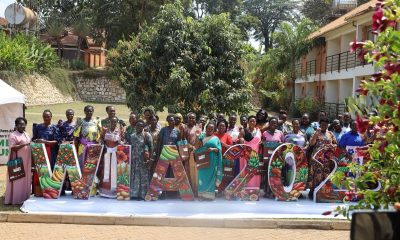
 MEDIA FOR CHANGE NETWORK2 weeks ago
MEDIA FOR CHANGE NETWORK2 weeks agoWomen’s groups demand equality in land tenure security to boost food production.
-
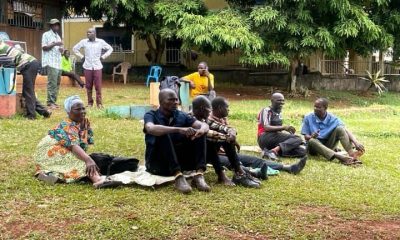
 MEDIA FOR CHANGE NETWORK2 weeks ago
MEDIA FOR CHANGE NETWORK2 weeks agoTension as Project-Affected Persons demand to meet Uganda’s President over Oil Palm growing on their grabbed land.
-

 MEDIA FOR CHANGE NETWORK2 weeks ago
MEDIA FOR CHANGE NETWORK2 weeks agoHidden iceberg: A new report identifies large scale industrial agriculture, livestock, and mining sectors as leading sources of attacks against land and environmental defenders worldwide.
-

 SPECIAL REPORTS AND PROJECTS2 weeks ago
SPECIAL REPORTS AND PROJECTS2 weeks agoBritain, Netherlands withdraw $2.2 billion backing for Total-led Mozambique LNG
-

 SPECIAL REPORTS AND PROJECTS1 week ago
SPECIAL REPORTS AND PROJECTS1 week ago‘Food and fossil fuel production causing $5bn of environmental damage an hour’

